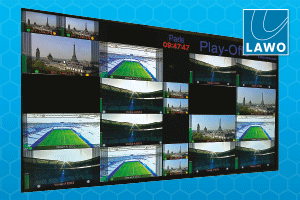Last week, Bahrain TV shifted its bouquet from Arabsat to Noorsat to protest the transmission of Iranian channels on Arabsats Badr satellite. Below is a clarification issued by Arabsat on its web site June 10 on some of the technical, operational and legal issues that might be unknown to the public. Arabsat also stated that […]
 Last week, Bahrain TV shifted its bouquet from Arabsat to Noorsat to protest the transmission of Iranian channels on Arabsats Badr satellite. Below is a clarification issued by Arabsat on its web site June 10 on some of the technical, operational and legal issues that might be unknown to the public. Arabsat also stated that it hoped in the light of these clarifications that Bahraini Radio and Television Union
would reconsider its decision to stop its transmission on Arabsat.
Last week, Bahrain TV shifted its bouquet from Arabsat to Noorsat to protest the transmission of Iranian channels on Arabsats Badr satellite. Below is a clarification issued by Arabsat on its web site June 10 on some of the technical, operational and legal issues that might be unknown to the public. Arabsat also stated that it hoped in the light of these clarifications that Bahraini Radio and Television Union
would reconsider its decision to stop its transmission on Arabsat.
Arab Satellite Communications Organization “Arabsat” has been following with much regret, what is reported about the organisation in the Different Mass Media (newspaper, websites, social platforms etc…) concerning the Radio and Television Union decision, in Kingdom of Bahrain, to stop broadcasting its TV Bouquet on Arabsat satellite Badr-4 in the orbital position 26°degrees East, especially with the announcement of the Authority that this decision is due to the broadcast of the Iranian channels on Arabsat satellite BADR-5 and that these channels are inciting the Kingdom of Bahrain, and calls for sectarianism and so on, and Arabsat has not taken any action in this regard.
The debate has developed in some websites and reached a far point of unreality, and has imposed Arabsat in political and religious debates that Arabsat doesnt have anything to do with it. Therefore, and as Arabsat believes that it should clarify the picture for the public opinion, we hope to note the following:
First, the commercial contract signed with Arabsat for leasing a satellite capacity for the benefit of the Iranian Space Agency on Arabsat satellite Badr-5 in the orbital position 26° degrees East was signed five years ago in 2007. This contract has been introduced, before signature, to the General Assembly of Arabsat attended by Arab Communications Ministers or their representatives with the participation of the delegation of the Kingdom of Bahrain, and it was unanimously approved without recording a minimum objection of any party, and therefore Arabsat went ahead in manufacturing Badr-5 satellite, for non-specialists in the field of satellites, the period of design, manufacture and launch of any satellite is up to three years, as the launch of BADR-5 was at the end of year 2010.
Second, the satellite capacities leased by Iran Space Agency and according the basic design of the satellite are limited in geographic coverage to the Iranian territories and the broadcast does not reach the Arab world in general, as it is dedicated to broadcast the Iranian channels to Iran, but the signal of some channels can be received intermittently by antennas wider than sixtieth centimeter for what they call in the field of designing satellites Spill Over, which leaks from the down link power of the satellite coverage to the neighboring areas.
Third, the Bahraini complain has specifically focused on Al-Alam channel, for public knowledge transmission of the Al-Alam channel has stopped over Arabsat covering the Arab territories for more than two years, but continued to be broadcasted on Nilesat orbital location to the entire Arab world, as well as The European satellite is still broadcasting it to all of the Arab countries.
Fourth, to reduce the impact of the spill over, Arabsat has reduced the signal strength of the bouquet that includes Al-Alam Channel, and we have reported that to the Kingdom of Bahrain, so that it became impossible to receive Al-Alam Channel in the Arab Gulf States, even with the use of large antennas, This procedure has been applied to the whole bouquet and not only for Al-Alam channel.
Fifth, the Iranian bouquet is still, up to date, being broadcasted to the entire Arab world on the European Satellite Hot Bird 13° degrees East therefore the Iranian Bouquet, including Al-Alam channel is received by all the viewers in the Arab countries. Also Al-Alam Channel is broadcasted from the Orbital position of Nilesat and received by all viewers throughout the Arab world.
Sixth, this issue has been put for discussion during the meeting of the General Assembly of Arabsat last month, and the necessary procedures have been taken in regard and respect to the signed contracts with all parties.
Seventh, since the date of the General Assembly of Arabsat at the beginning of last April and with strenuous undeclared efforts with the Iranian side, to protect Arabsat legally and contractually, Arabsat has reached an agreement with the Iranian side to stop the broadcast of Al-Alam channel on the Iranian bouquet.


















































































